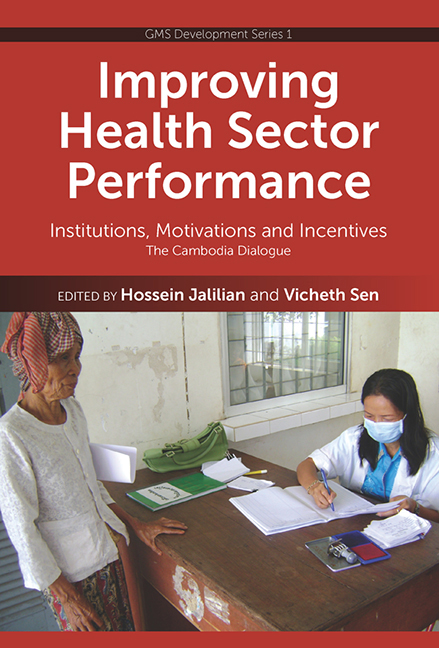 Improving Health Sector Performance
Improving Health Sector Performance from Part IV - Managing Doctors and Nurses
Published online by Cambridge University Press: 21 October 2015
INTRODUCTION
This chapter reports the results of a study of managers in the Cambodian health sector and the performance of their organizations. The study was conducted in 2009 after the government introduced wide-ranging changes in the way health services were organized and managed. These changes included: better specified service delivery contracts between provincial health departments, hospitals, and district service managers (including targets); increased autonomy for hospital and district managers to manage their staff and budgets within the terms of those contracts; and improved staff performance and accountability regimes.
However, changes to the way the Cambodian health sector is managed are far from complete, and further improvements will be needed to make it more effective and efficient. But before such reforms are planned and implemented, taking stock of the reforms implemented to date would appear to be useful. For that reason, this study attempts to collect baseline data in order to analyse whether there is any relationship between health sector management practice and health service performance. It applies a survey technique, building on the methods of Bloom and van Reenen (2007), to measure management practice quality and, using data from a survey in sixty Cambodian health sector organizations, seeks to link management practice to organizational performance.
The goal of this study was also to contribute to the scarce empirical literature that attempts to establish a causal link between management quality and organizational performance. Unfortunately, however, the quantitative results presented here are generally inconclusive. There seems to be little systematic correlation between a whole range of health sector performance indicators and proxies for the quality of management in an organization.
If management matters, as is widely believed, then there may simply be methodological problems. And it must be declared up front that a number of practical and methodological obstacles encountered during this study are likely to lead to its inconclusive results. Specifically, severe shortcomings were found in the consistency and plausibility of the Cambodian health sector performance data (here used as dependent variables). Also, methodological problems emerged during the innovative management survey. More generally, the extremely tight financial and temporal constraints within which this study was conducted implied that questionnaire testing and refinement — requiring translation between English and Khmer each time — were at their absolute minimum.
To save this book to your Kindle, first ensure [email protected] is added to your Approved Personal Document E-mail List under your Personal Document Settings on the Manage Your Content and Devices page of your Amazon account. Then enter the ‘name’ part of your Kindle email address below. Find out more about saving to your Kindle.
Note you can select to save to either the @free.kindle.com or @kindle.com variations. ‘@free.kindle.com’ emails are free but can only be saved to your device when it is connected to wi-fi. ‘@kindle.com’ emails can be delivered even when you are not connected to wi-fi, but note that service fees apply.
Find out more about the Kindle Personal Document Service.
To save content items to your account, please confirm that you agree to abide by our usage policies. If this is the first time you use this feature, you will be asked to authorise Cambridge Core to connect with your account. Find out more about saving content to Dropbox.
To save content items to your account, please confirm that you agree to abide by our usage policies. If this is the first time you use this feature, you will be asked to authorise Cambridge Core to connect with your account. Find out more about saving content to Google Drive.